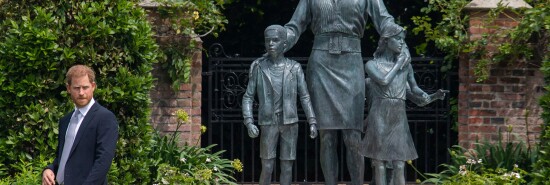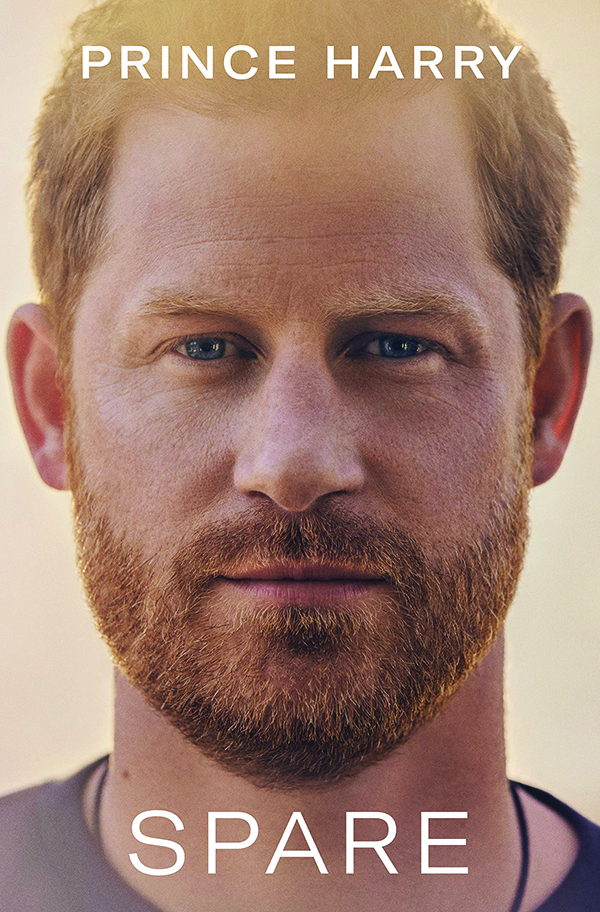
Spare me
Charlotte Allen
By now, a week after publication and thanks to leaks, jeering reviews, and through-the-ceiling sales, everyone who’s not a Sentinel Island isolate knows by heart all the cringeworthy tidbits in 38-year-old Prince Harry’s lugubrious memoir, Spare.

There’s the time his older brother William, now the U.K.’s prince of Wales, knocked him to the floor in 2019 and broke his necklace; the frostbitten penis resulting from a North Pole excursion that Harry helped mend by rubbing on it some of the Elizabeth Arden lip balm that his mother, the ill-fated Princess Diana, had used in her day; the jokes that Harry’s father, now ruler of the U.K. as King Charles III, allegedly made to his younger son about not being his real father. (Those actually seemed to be gentle jests involving a patient Charles had met on a tour of a mental hospital who fancied himself to be also the prince of Wales, and not, as Harry interprets them, inappropriate references to the ginger-haired cavalry officer James Hewitt, Diana’s riding instructor, with whom she started an extramarital affair when Harry was 2.)
Both the legacy media and the wits of social media have made endless fun of the wuss and chronic oversharer that Harry has unintentionally painted himself as in his 400-odd-page tell-all. He seethes with resentment that William, as the elder of the two boys, got to be the “Heir,” at least presumptively, to the British throne, as well as the sibling who always landed the bigger bedroom at Balmoral Castle and other royal family dwellings. Harry brims over with self-pity at his own status as the “Spare,” brought into this world as insurance “in case something happened to Willy,” he writes. Harry playfully fantasizes — at least we hope it’s a playful fantasy — that one of his duties as Spare was to supply the occasional “spare part” (kidney, bone marrow, and so forth) should the Heir encounter a medical emergency.
Charles (“Pa” in Harry’s book) is a cold fish who obsesses over protocol and cannot bring himself to hug his younger son while breaking the news about Diana’s death on Aug. 31, 1997, after a car crash in Paris about a year following her divorce. The recently deceased Queen Elizabeth II (“Granny”) is a remote and formidable figure who hews to a “never complain, never explain” royal ethos that covers up family and palace bickering, mental dysfunction, and rivalries that Harry apparently believes should be aired in public.
The cynosure of Harry’s grievances, as we all know too well, is what Harry insists is his family’s heartless treatment of Meghan, the American actress he married in 2018, treatment so cavalier, according to Harry, that it effectively drove the couple (“in fear for our sanity and physical safety”) out of the U.K. and into exile in California less than two years later, where they remain to this day minus their royal duties and prerogatives. Harry’s complaints — the racism supposedly leveled at Meghan, who is half-black, the supposedly fake stories supposedly leaked by the palace to the press that painted her as bullying the staff and insulting her sister-in-law, Kate — have already been thoroughly aired in public thanks to Harry’s and Meghan’s relentless self-promotion. First, the 85-minute interview with Oprah Winfrey in March 2021, in which Meghan alleged that her in-laws had driven her to contemplating suicide. Then, the six-hour Netflix series Harry and Meghan in the fall of 2022, going over the same territory in more detail and demanding an apology from the alleged chief offenders, Charles and William. Spare, devoting a mere 70 pages or so to this rift, seems anticlimactic by contrast.
That’s because, in fact, this book isn’t really about Harry himself at all. It is, rather, a study in Harry’s unquenchable longing for the dead Diana. It is amazing, and also disturbing, how frequent are Harry’s references to “Mummy” and “my mother.” They begin around page three: “Her devastating smile, her vulnerable eyes, her childlike love of movies and music and clothes and sweets — and us.” They end around page 395, when Harry visits a medium who purports to conjure up Diana’s ghost. In between, it takes him years to persuade himself that his mother has not simply disappeared somewhere. He brings a bottle of her perfume to one of his frequent therapy sessions. He keeps a lock of her hair in a box by his bedside. Elton John singing “Candle in the Wind” makes not one but two appearances, first at Diana’s funeral, then at a 10th-anniversary memorial. When Diana died, Harry was just shy of 13, undergoing puberty, when for most boys, women suddenly change from pests to the most alluring creatures on Earth. Still, when I read this, in his account of the Elizabeth Arden cream he applied to his frostbitten penis (“The smell transported me through time. I felt as if my mother was right there in the room”), I hoped I’d be forgiven for thinking of Norman Bates.
Harry’s single-minded Dianolatry and his readiness to make a victim out of his mother (she’d “either bolted or been thrown out” of the palace, he writes) explains much. It certainly explains his antagonism toward his father. Diana indeed had the misfortune to marry a man who not only had a mistress but wished he could have married her instead of Diana. As for the mistress (now Charles’s queen), Camilla, whose divorce from her first husband had barred her from ascending the throne, she is the wicked stepmother who conspires with her husband and a vulturous press to release or do nothing to stop the release of the reports that Harry believes have slandered him and his wife. And since Diana famously died after the Mercedes carrying her and her playboy boyfriend, Dodi Fayed, crashed into a pillar while presumably trying to outrun paparazzi, the “paps,” the media, are for Harry simply a pack of velociraptors who couldn’t possibly have reliable sources attesting to the allegedly abrasive behavior on Meghan’s part that enraged William and others.
Harry seems unaware that some of the gilt has weathered off the Diana lily during the 26 years since her death. Diana entertained a string of lovers starting when Harry was a toddler, most of whom were evidence of her dubious taste in men. She also, far from fleeing the press, was a willing source of leaks designed to portray her as a victim of her husband’s hidebound and unfeeling family. Indeed, she spent most of the summer of 1997 on Fayed’s yacht, and the boys to whom she claimed such devotion saw her only once. A 2006 British inquest into Diana’s death revealed that while paparazzi were indeed chasing the Mercedes, the real cause of the accident was the blood-alcohol level of the driver, who was going 70 miles per hour in a 30-mile-per-hour zone. None of the occupants of the car was wearing a seat belt.
Harry clearly intended Spare to generate pathos. That it does, but not exactly of the kind that its author must have intended. It is the sad story of a younger son who failed to realize that all sons and daughters are born into birth orders and family circumstances that they wouldn’t necessarily have chosen on their own but that they do have the power to transcend.
Charlotte Allen is a Washington writer. Her articles have appeared in Quillette, the Wall Street Journal, USA Today, and the Los Angeles Times.
